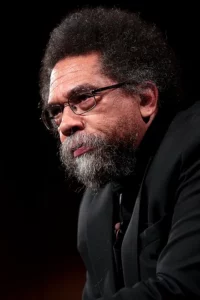
Cornell West, candidate for president in 2024.
Cornel West announced in early June that he was running for president of the United States as the candidate for the People’s Party and then as aspiring to be candidate of the Green Party. This series of articles explores the experience of Black political candidates for the nation’s highest offices.. In Part 1 of this article, we looked at the reaction of the left to West’s candidacy. In Part 2 we turn to look at the experience of four Black presidential candidates in 1968. In Part 3 we examined the campaign of Shirley Chisholm in 1972. In Part 4 of the series we recalled the experience of Angela Davis, twice candidate for vice-president. In this fifth part, we go back to look at the very first Black candidate for president Clifton DeBerry who ran in 1964.
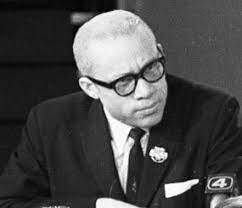
Clifton DeBerry, candidate for president in 1964.
The first Black candidate for president was Clifton DeBerry, the nominee of the Socialist Workers Party in 1964, running against right-wing Republican Barry Goldwater and liberal Democrat Lyndon B. Johnson. Harassed by the FBI, DeBerry would have a tough row to hoe.
DeBerry was born on September 18, 1923 in Holly Spring, Mississippi. His family was part of the Great Migration of African Americans to the North, traveling like many on the Illinois Central Railroad to Chicago, Illinois. He attended Wendell Phillips High School, named after the famous abolitionist, in Bronzeville, the first Black neighborhood in Chicago.
DeBerry became an organizer for the Communist-led Farm Equipment Workers Union, later affiliated with the United Auto Workers Union, working in the Midwest and the South. Later he became a house painter. He was a delegate to the Negro Labor Congress convention held in Cincinnati, Ohio in 1950 and then to the founding convention of the Negro American Labor Council in Detroit in 1960. When the Montgomery, Alabama bus boycott began in 1955, DeBerry organized Station-Wagons-To-Montgomery to support the boycott[1].
DeBerry’s party, the Socialist Workers Party, had been formed by former-Communists who had been expelled from the CP because they supported the Russian revolutionary Leon Trotsky and criticized Joseph Stalin’s leadership of the Soviet Union and the Communist International. After leaving the CP, the Trotskyists played a leading role in the Minneapolis Teamsters strikes of the 1930s that transformed the Teamsters and turned it into a powerful industrial union. President Franklin D. Roosevelt, concerned about “fifth column” organizations that might undermine U.S. war production and empowered FBI head Herbert Hoover to carry out investigations.
In June 1941 the FBI arrested twenty-nine party members, fifteen of whom also belonged to Teamsters Local 544. They were tried under the Smith Act, that is, the Alien Registration Act of 1940, a peacetime sedition law that limited free speech such as the advocacy of revolution. Eighteen of the defendants were convicted under the Smith Act, and in December sentenced to prison terms ranging from twelve to sixteen months. The Communist Party foolishly cheered the convictions under the act which would later be used against it. The arrest of so many key leaders of the party’s most important labor work had a devastating impact from which the party never recovered.
The SWP was far smaller than the Communist Party, which at the end of World War II had about 100,000 members and one million in its periphery, and the SWP suffered splits that carried away many of its members. In the late 1940, Max Shachtman led about half the SWP’s members to leave that party and from the Workers Party, while in 1959, Sam Marcy led another large group out of the SWP and in a Stalinist direction. Then in 1954 the SWP expelled the followers of Bert Cochran. Still, greatly reduced in numbers, the SWP continued to behave as if it were a mass party, putting forward its Teamster leader of the 1930s Farrell Dobbs for president in 1948, 1952, 1956 and then in 1960. In 1960 Farrell Dobbs, received 60,166 votes or 0.06% of the total votes cast.
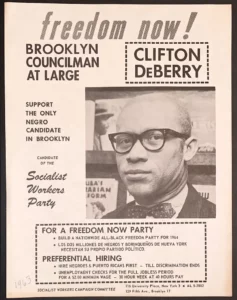 In the early 1960s, the SWP began to revitalize by relating to the Black civil rights movement and supporting the Cuban Revolution of 1959 through the Fair Play for Cuba Committee. Dobbs and other SWP leaders visited Cuba and DeBerry played a major role in the attempt to develop relations to the civil rights movement. In the early 1960s, DeBerry became the branch organizer of the Socialist Workers Party in New York City and later the New York State organizer. In 1963, he ran as the party’s candidate for the Brooklyn Councilman-at-Large and he also conducted a national speaking tour discussing the Black “Freedom Now Struggle” and supporting the Freedom Now Party that the SWP had created.
In the early 1960s, the SWP began to revitalize by relating to the Black civil rights movement and supporting the Cuban Revolution of 1959 through the Fair Play for Cuba Committee. Dobbs and other SWP leaders visited Cuba and DeBerry played a major role in the attempt to develop relations to the civil rights movement. In the early 1960s, DeBerry became the branch organizer of the Socialist Workers Party in New York City and later the New York State organizer. In 1963, he ran as the party’s candidate for the Brooklyn Councilman-at-Large and he also conducted a national speaking tour discussing the Black “Freedom Now Struggle” and supporting the Freedom Now Party that the SWP had created.
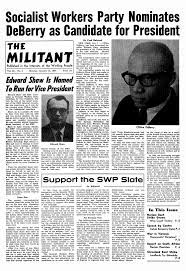 At the SWP’s Convention in January 1964, Farrell Dobbs nominated DeBerry to be the party’s presidential candidate. The vote for DeBerry was unanimous, the party’s newspaper, The Militant, reported. The Militant noted: “DeBerry is the first Negro in U.S. history to be chosen by a political party as its presidential candidate.”[2]
At the SWP’s Convention in January 1964, Farrell Dobbs nominated DeBerry to be the party’s presidential candidate. The vote for DeBerry was unanimous, the party’s newspaper, The Militant, reported. The Militant noted: “DeBerry is the first Negro in U.S. history to be chosen by a political party as its presidential candidate.”[2]
DeBerry spoke out strongly against bothDemocratic candidate Lyndon B. Johnson and Republican nominee Barry Goldwater. His campaign literature laid out his party’s program in brief, combining the demands of the Black movment, the labor movement, and the anti-imperialist left.
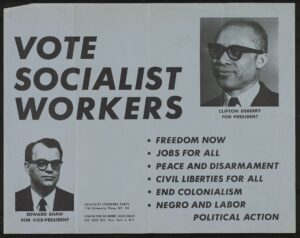
In 1963, when DeBerry appeared at a hall in Chicago to give a campaign speech, he was arrested by the Chicago Police at the request of the Cook County Department of Welfare for failure to make child support payments. He was taken to the police station, immediately released on bail, and returned to make his speech. The FBI had been behind the whole business, having investigated DeBerry and learned he wasn’t paying child support, the FBI contacted the Welfare Department and the Chicago Police. DeBerry was subsequently convicted and given a six-month jail sentence, but allowed to go free when he agreed to make the back child support payments. The FBI sent reports of DeBerry’s personal problems to newspapers editors and reporters. While the FBI was responsible for the harassment, DeBerry was responsible for failing to support the child he fathered.[3] Those events were an embarrassment to the campaign.
The FBI also sowed discord between DeBerry and others on the Black left. According to an SWP suit against the U.S. Attorney General,
In May 1964 the New York FBI office made an anonymous mailing to various persons, including Daniel Watts and Harold Cruse, editors of a publication called ‘Liberator.’ The anonymous mailing suggested that the SWP was trying to manipulate the civil rights movement for its own benefit. Cruse later wrote articles in “Liberator” attacking DeBerry and the SWP. An FBI memorandum indicated satisfaction with this, reasoning that these articles would hinder any SWP efforts to form an alliance with the “rising tide of Negro radicals.[4]
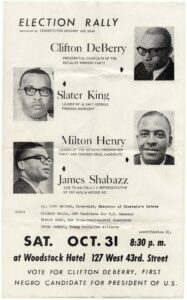 Still, despite the FBI’s dirty tricks, the campaign continued. On Saturday, October 31 at the Woodstock Hotel in New York City DeBerry spoke with three other Black men Slater King was the head of the SWP-led Freedom Now Party in Albany, Georgia and a Milton Henry a Freedom Now Party candidate for Congress, but more importantly James Shabazz, an aid to Malcolm X and representative of Muslim Mosque Incorporated. Other SWP members would establish a relationship with Malcolm X before his assassination in 1965. In the end, DeBerry got 32,327 or 0.5 percent of the votes cast, little more than half of Dobbs’ campaign four years earlier. The Freedom Now Party which DeBerry had been active in building died the following year.
Still, despite the FBI’s dirty tricks, the campaign continued. On Saturday, October 31 at the Woodstock Hotel in New York City DeBerry spoke with three other Black men Slater King was the head of the SWP-led Freedom Now Party in Albany, Georgia and a Milton Henry a Freedom Now Party candidate for Congress, but more importantly James Shabazz, an aid to Malcolm X and representative of Muslim Mosque Incorporated. Other SWP members would establish a relationship with Malcolm X before his assassination in 1965. In the end, DeBerry got 32,327 or 0.5 percent of the votes cast, little more than half of Dobbs’ campaign four years earlier. The Freedom Now Party which DeBerry had been active in building died the following year.
Whatever the problems and whatever the vote, DeBerry’s 1964 run for the presidency was historically significant. At the height of the civil rights movement, the SWP had the political savvy to put forward a Black man for president. Moreover, DeBerry’s biography was typical of millions of Black Americans as part of the Great Migration from the South who had become part of the working class in the North. As union organizer and party staffer, he represented the commitment to the working class and socialism that the party espoused. His campaign as the first Black man to run for president was pathbreaking, opening the way for Communist Charlene Mitchell to be the first Black woman candidate in 1968, and for the others: Eldridge Cleaver, Dick Gregory, Shirley Chisholm, Reverend Jesse Jackson, and Barack Obama.
Notes
[1] Biographical information from several sources including Fred Halstead, “Socialist Walkers Party Nominates DeBerry as Candidate for President,” The Militant, January 13, 1964.
[2] Fred Halstead, “Socialist Walkers Party Nominates DeBerry as Candidate for President,” The Militant, January 13, 1964.
[3] Socialist Workers Party v. Attorney General of US, 642 F. Supp. 1357 (S.D.N.Y. 1986)
US District Court for the Southern District of New York – 642 F. Supp. 1357 (S.D.N.Y. 1986)
August 25, 1986, at:
https://law.justia.com/cases/federal/district-courts/FSupp/642/1357/2398821/
[4] Ibid.


Leave a Reply